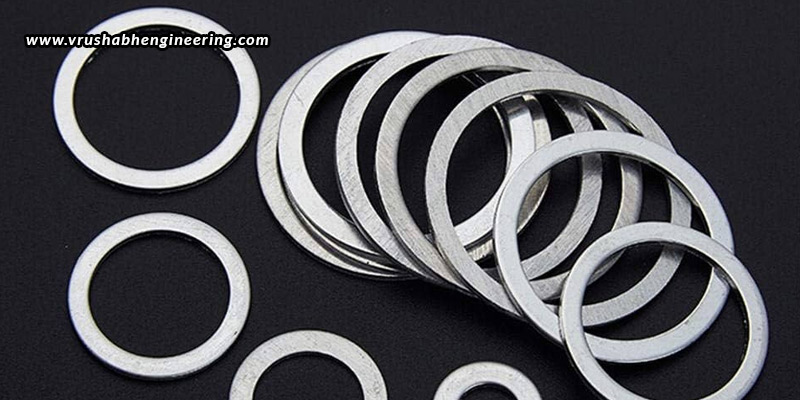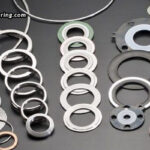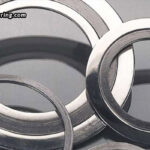In industrial and engineering settings, it is essential to maintain a reliable seal between two surfaces. A metal gasket ring is one of the most trustworthy solutions for environments that experience high pressure, high temperatures, and chemical aggressiveness. Choosing the correct metal gasket necessitates thorough evaluation of various factors to guarantee safety, performance, and durability. Let’s discuss everything you need to know to select the right metal gasket ring for your project, including important considerations like temperature, pressure, chemical compatibility, materials, and more.
Temperature
Temperature is a vital aspect to consider when choosing a metal gasket ring. The gasket must preserve its integrity and sealing capability even in extreme heat or cold conditions. For applications involving high temperatures, metals like stainless steel, Inconel, or Monel are frequently utilized, often paired with graphite or PTFE fillers to improve thermal resistance. In cryogenic scenarios, gaskets need to remain pliable at very low temperatures, making soft stainless steel or specialized alloys the preferred options. It is crucial to take into account both the operating temperature and the possibility of thermal cycling, as repeated expansion and contraction can undermine a gasket’s sealing effectiveness over time.
Pressure
A key factor to consider when selecting a metal gasket is the pressure within your system. Employing a gasket that cannot endure the system pressure may result in leaks, flange damage, and potential safety risks. For low-pressure applications under 50 bar, softer fillers or thinner spiral wound gaskets might suffice. Systems functioning between 50–200 bar, categorized as medium pressure, typically necessitate reinforced spiral wound or solid metal gaskets to guarantee a dependable seal. For high-pressure applications exceeding 200 bar, ring joint gaskets or fully metallic designs are advisable. It is vital to always consult the pressure-temperature (P-T) ratings provided by the manufacturer, as various metals and gasket designs can withstand different pressures at diverse temperatures.
Chemical compatibility
Chemical compatibility is an essential factor to consider, as the gasket must withstand the conditions it will face. Even the strongest metal gaskets can deteriorate rapidly when exposed to corrosive or chemically aggressive substances. For environments with acidic properties, metals such as Hastelloy or Monel provide outstanding resistance. In alkaline or caustic environments, stainless steel and specific nickel alloys are more appropriate. For systems involving hydrocarbons or oil, carbon steel, stainless steel, or combinations that include PTFE fillers are frequently utilized. When choosing a gasket, it is crucial to align the metal type and filler material with the specific chemicals present in your system. Numerous gasket manufacturers offer compatibility charts to facilitate this selection process.
Flange type and surface finish
The flange type and its surface finish are also critical factors in gasket selection. For raised face flanges, spiral wound and ring joint gaskets are typically the best choice, while flat face flanges may necessitate metal jacketed gaskets with soft fillers. The roughness of the surface impacts sealing effectiveness: very smooth surfaces might require softer fillers to ensure a leak-proof seal, while rough surfaces could need reinforced gaskets. A vital step is to examine flanges for any warping or damage, as even the highest quality gasket cannot create a proper seal on a poorly prepared surface.
Gasket material
Selecting the right combination of metal and filler is vital to guarantee the gasket operates reliably under its working conditions. Spiral wound gaskets generally utilize stainless steel or carbon steel paired with graphite or PTFE fillers, making them ideal for high-pressure and high-temperature chemical environments. Ring joint gaskets, typically constructed from carbon steel, alloy steel, or stainless steel, do not incorporate fillers and are perfect for high-pressure piping applications in the oil and gas sector. Solid metal gaskets, crafted from stainless steel or nickel alloys, are appropriate for extremely high-pressure and high-temperature scenarios. It is crucial to align the mechanical properties of the metal with the system’s requirements to ensure long-term performance and safety.
Gasket thickness and size
Accurate sizing of the gasket is essential to avoid uneven compression, leaks, and possible system failures. It is necessary to measure flange dimensions accurately and choose gasket thickness based on the operating pressure and the needed compressive stress. Furthermore, bolt load must be taken into account to confirm that the gasket can endure the applied force without permanent deformation, which could jeopardize the seal. Proper sizing guarantees uniform sealing and extends the gasket’s lifespan.
Industry standards & certifications
Selecting gaskets that adhere to established standards guarantees reliability, safety, and adherence to industry regulations. Standards like ASME B16.20 and B16.5 outline the requirements for metallic gaskets used in flanged joints, whereas API 601 pertains to metal gaskets designed for high-pressure scenarios in the oil and gas sector. Furthermore, opting for gaskets from manufacturers certified under ISO 9001 or 14001 ensures consistent quality and compliance with environmental and safety standards. It is crucial to verify that the gasket material and design align with the specific regulations relevant to your industry to mitigate operational and safety hazards.
Common mistakes to avoid
Choosing and installing metal gaskets correctly is crucial for system safety and efficiency. Avoiding common mistakes such as ignoring chemical compatibility, improper installation, or using the wrong gasket type can prevent leaks, equipment damage, and costly downtime.
- Using the wrong gasket type for pressure/temperature: Selecting a gasket that does not match the system’s pressure and temperature requirements is a critical error. For example, a spiral wound gasket may perform excellently under moderate pressures but fail under extreme high-pressure conditions where a ring joint gasket is necessary. Understanding the operating parameters and choosing a gasket type specifically designed for those conditions is crucial to avoid leaks and system failures.
- Ignoring chemical compatibility: One of the most frequent mistakes when selecting metal gaskets is overlooking the chemical environment in which the gasket will operate. Using a gasket material that is not resistant to the specific fluids or gases in the system can lead to rapid corrosion, degradation, and ultimately, leaks. Always verify that both the metal and any filler materials are compatible with the chemicals they will contact to ensure long-term performance and safety.
- Overlooking flange surface condition: Even the highest-quality gasket cannot seal properly if the flange surfaces are warped, scratched, or contaminated with rust, oil, or debris. Failing to inspect and prepare the flange faces before installation can result in uneven compression, leaks, and potential system damage. Proper cleaning, resurfacing if necessary, and careful inspection of the flange condition are essential steps before installing any gasket.
- Improper installation or uneven bolt torque: Even the correct gasket can fail if installed incorrectly. Uneven tightening of bolts can cause non-uniform compression, resulting in leaks and gasket deformation. Following proper torque sequences and manufacturer-recommended values ensures that the gasket is evenly compressed and forms a reliable seal. This is especially important for high-pressure applications where even slight deviations can compromise safety.
- Reusing gaskets not designed for multiple uses: Some gaskets are designed for single-use only. Reusing them can compromise their sealing ability because compression set, deformation, or minor surface damage may have occurred during the previous installation. Using a worn gasket increases the risk of leaks and may lead to costly maintenance or system downtime. Always check whether a gasket is reusable before considering it for another installation.
Avoiding these common mistakes not only ensures a longer lifespan for your gaskets but also prevents potential leaks, equipment damage, safety hazards, and unnecessary costs. Proper selection, installation, and maintenance are key to achieving a reliable and leak-free seal. Partnering with a trusted supplier like Vrushabh Engineering, the best metal rings manufacturer in India, can further minimize risks, as they provide high-quality, precision-engineered gaskets designed to perform reliably under extreme temperatures, pressures, and chemical environments.
Choosing the right metal gasket ring is an essential choice that impacts the safety, efficiency, and durability of your system. By thoroughly assessing factors like temperature, pressure, chemical compatibility, flange type, material, and size, you can guarantee a dependable seal that fulfils your project’s requirements. Regardless of whether you are involved in oil and gas, chemical processing, automotive, or power generation, selecting the right metal gasket not only averts leaks but also improves safety and lowers maintenance expenses.





